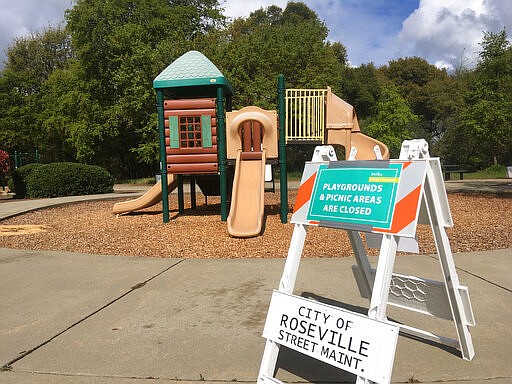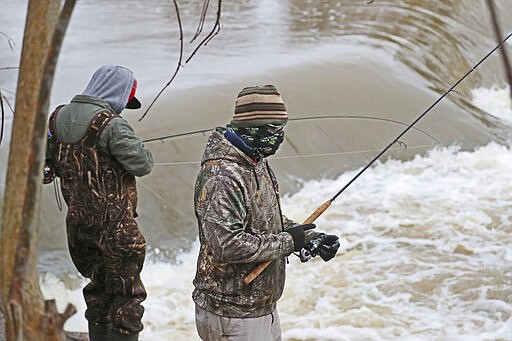What you need to know today about the virus outbreak
President Donald Trump on Sunday extended the country's voluntary national shutdown for a month, significantly changing his tone on the coronavirus pandemic only days after musing about the country reopening in a few weeks. He heeded public-health experts who told him the virus could claim over 100,000 lives in the U.S., perhaps more, if not enough is done to fight it.
COVID-19 continues its relentless spread, as the daily number of infections worldwide continues to jump sharply. World Health Organization figures show the increase in new infections is now about 70,000 per day - up from about 50,000 just days ago. More than 32,000 people have died worldwide. The U.S. had over 139,000 infections and 2,400 deaths, a running tally by a prominent university showed Sunday evening.
The U.S. government’s top infectious-disease expert warned that the outbreak could kill 100,000 to 200,000 Americans. Dr. Anthony Fauci, director of the National Institute of Allergy and Infectious Diseases, also said on CNN’s “State of the Union” that millions in the U.S. could become infected.
Italy reported more than 750 new deaths Sunday, bringing the country’s total to nearly 10,800 - vastly more than any other country. But the number of new infections showed signs of narrowing again. Officials said more than 5,200 new cases were recorded in the last 24 hours, the lowest number in four days, for a total of almost 98,000 infections.
Here are some of AP's top stories Saturday on the world's coronavirus pandemic. Follow APNews.com/VirusOutbreak for updates through the day and APNews.com/UnderstandingtheOutbreak for stories explaining some of its complexities.
WHAT'S HAPPENING TODAY:
— The mammoth, $2.2 trillion stimulus package to shore up the U.S. economy during the coronavirus pandemic doesn't provide what doctors, nurses and other health care providers need most: protective equipment.
— New York state's death toll from the outbreak climbed above 1,000 on Sunday, less than a month after the disease was first detected in the state. New York state accounts for more than 40% of U.S. deaths from COVID-19.
— Risk factors other than age are becoming more apparent. As much as 10% to 15% of people under 50 have moderate to severe symptoms, according to the World Health Organization.
— German Chancellor Angela Merkel's handling of the coronavirus crisis meets with strong approval in her country.
— Coronavirus pandemic causes tensions in the hard-hit European Union.
— Impoverished Somalia has little in the way of health care to battle the coronavirus should the limited number of cases there rise.
— The family of John Prine says the American singer-songwriter is critically ill and has been placed on a ventilator while being treated for COVID-19-type symptoms.
— Parents who have to report to work are scrambling to find adequate child care.
___
WHAT YOU NEED TO KNOW:
For most people, the coronavirus causes mild or moderate symptoms, such as fever and cough that clear up in two to three weeks. For some, especially older adults and people with existing health problems, it can cause more severe illness, including pneumonia and death. The vast majority of people recover.
Here are the symptoms of the virus compared with the common flu.
One of the best ways to prevent spread of the virus is washing your hands with soap and water. The U.S. Centers for Disease Control and Prevention recommends first washing with warm or cold water and then lathering soap for 20 seconds to get it on the backs of hands, between fingers and under fingernails before rinsing off.
You should wash your phone, too. Here’s how.
Misinformation overload: How to separate fact from fiction and rumor from deliberate efforts to mislead.
TRACKING THE VIRUS: Drill down and zoom in at the individual county level, and you can access numbers that will show you the situation where you are, and where loved ones or people you’re worried about live.
___
ONE NUMBER:
33: That's Andrea Napoli's age. The Rome lawyer was in top physical shape, thanks to regular workouts, including water polo training, when he tested positive for the coronavirus. He spent two days in intensive care and nine days breathing with an oxygen mask.
___
IN OTHER NEWS:
SONG FOR AFRICA: Bobi Wine, a Ugandan pop singer and opposition leader, releases song to urge the continent of 1.3 billion people to wash their hands.
PIZZERIA HAILED: New Jersey pizzeria takes out a loan to pay workers' salaries, then finds more people eager to help.
___
Follow AP coverage of the virus outbreak at https://apnews.com/VirusOutbreak and https://apnews.com/UnderstandingtheOutbreak
























